August 2023: Olive Tree

Volume VIII/Issue 5/August 2023


From The Editorial Desk
The Name Michael
Who needs a Pope?
Clearly, the perception of the Papacy changed over the last six decades. Not only have infamous anti-popes distorted the public image, also modernist thinking poisoned the mental concept of the Papacy of many. One variant of eroded beliefs in Papacy, which I would call Divinists, stems from the vacancy after Pius XII.
David Bawden, later Michael I, grew up when some clergy and lay people figured out, that the Holy See was vacant and a series of anti-popes has reigned from the Vatican. They searched through Encyclicals, Catholic history books, canon law and writings of the fathers, for guidance in that unprecedented crisis. Naturally, various strands of opinions began to form.
In the late 1980ies, I think that roughly three lines of thought were predominantly discussed in a vaguely defined field – from critics of the current Vatican-regime to committed sedevacantists – to analyze and deal with the situation after the so-called Vatican II council: a) Conclavists: Clergy of the sedevacante position should reach a consensus on proper modalities and carry out a papal election; b) Resisters: Resist Vatican II errors and carry on as traditional as possible; c) Divinists: Wait for Divine intervention;
Documents archived by Pope Michael I and his reports on events of that era suggest that central figures supporting the first line of thought, who deemed a papal election as indispensable, were widely heard. Today, conclavist voices have fallen silent. It seems, that all efforts and activities regarding this line of thought have quietly faded out. In its place, the Divinists thinking has spread, which represents moving away from personal agency to passive coping. Unwilling or unable to accept Pope Michael I, it seems that minds have shifted to a state of reconciling with the crisis and resigned astonishment, witnessing the demise of Catholic culture and everyday-life.
In an article of Doctor Homero Johas of 1991 (“Is A Pope Necessary?”) we read the following, illustrating the concept of Divine intervention of that time: “[O]ne should believe that, in the present crisis, the duty is the abstention of practical actions, we must pray exclusively, until God intervenes ...” – “One must reject the ending of the crisis by practical initiative; the crisis cannot be solved at the natural level because it is too big.” – “We should not frustrate the divine plan by natural means, by a conclave.” – “We believe that the crisis will only be ended by God’s intervention.” – “The crisis cannot be solved by natural resources, by practical intervention, because it transcends the natural order, it is extraordinary. It is a lack of faith to affirm that it will be ended by any other way.”
Since that time, the thesis of Divine intervention has grown considerably in followers and ideological facets. Largely beliefs range between two anchors, which facilitate the apocalyptic interpretation of the current situation: Some hold that a 70-year or longer vacancy of the Holy See is predicted in the Bible. Others think that the true Catholic Church is trapped and incapacitated within the Vatican II sect. However, holding such positions – or one of the many individual blends of both – has compelling consequences: Because there is no Magisterium and Authority without a Vicar of Christ on Earth, these beliefs result in confusion and lawlessness.
Now there are many important aspects in conjunction with Divinist beliefs, but I would like to point to one obvious fallacy: Suppose Divinists are correct, and we are living in the foretold last days, which are characterized by deception, false prophets, false signs and wonders etc. How can Divinists distinguish between supernatural intervention to end their crisis and the great false signs and wonders, which are expected in these days? How do Divinist determine, if their independent mode of life needs correction when the time of their savior has come? How could one be saved without the guidance of the Holy Ghost by the Pope? While Catholics can rely on the Church to guide them, where do Divinists turn to?
While a lot of endtimes-talk is produced, I hardly hear calls for guidance and authoritative judgements as remedy against disaster. Who needs a Pope, one might ask? I think that for sedevacantists today accepting Pope Michael II or contemplating a papal election, now almost amounts to sacrilege. So the situation of Divinists seems to offer no clear solution for their crisis, but leads to ever more irrational eschatological mysticism, while clinging to external traditionalist behavior. Is it absurd to think of the time 2000 years ago, when religious leaders couldn´t bring themselves to accept the Messiah of God? What was the consequence of clinging to self-deception and ego-centered believes, but hatred, confusion and lawlessness?

In the Midst Of The Troubled Sea
“There is no peace to the wicked, saith the Lord God.”—Isa. 57:21.
“Cry aloud, cease not, do not hold back, lift up thy voice like a trumpet, and shew my people their wicked doings, and the house of Jacob their sins. ”—Isa. 58:1.
We will do well to hear and give heed to the clear, prophetic voice of Isaiah as he articulates the message of God. What he wrote for his nation just over three millennia ago is right here in the Bible for us today.
The ungodly world which he labels as “the wicked” is like the turbulent waters of the storm-ravaged seas. They are unsettled. They are tossed to and fro. They are dangerous. They have no peace today; and because of their rejection of the Lord, they will not have it tomorrow. Their way of life has a faulty foundation; consequently, they can never rest. They can have no expectation of anything other than trouble.
On the other hand, the Lord’s mandate to the prophet was “Cry aloud, cease not, do not hold back, lift up thy voice like a trumpet” What was that about? Even the Lord’s people need a course correction. It was a call to repentance and revival in their life.
If God’s people fall into the same lifestyle as the world, they will find themselves also being tossed as though they too were on “the troubled sea.”
In twenty-first-century America, we are in the same dilemma. “The troubled sea” is always near at hand. We can see the “mire and dirt” that has been churned up by societal storms.
Every priest needs to rise to the occasion with a trumpet voice. He needs to “cry aloud.” That suggests both volume and boldness. He must have the conviction and the courage to “spare not.” That is, don’t hold back. Proclaim the truth.
Popular or unpopular, be the Lord’s ambassador.
When the people of God transgress the law of God and sin against God, they need to hear the prophet’s voice. Folks, these are troubled times, but let’s do the Lord’s bidding and stand up tall even “in the midst of the troubled sea.”

10 Timely Tips for Team Players
As the servants of Christ we are in the family of God and we have been commissioned of our Lord to be His ambassadors in the harvest fields of this earth.
“This precept I commend to thee, O son Timothy; according to the prophecies going before on thee, that thou war in them a good warfare.”—I Tim. 1:18.
“Thou therefore endure hardness, as a good soldier of Jesus Christ. No man that warreth entangleth himself with the affairs of this life; that he may please him who hath chosen him to be a soldier.”—II Tim. 2:3, 4.
Each one of us is just one member of a larger team. Your local Parish is that team where we labor with our brothers and sisters in Christ to carry forth the Lord’s work.
Here are ten timely tips to enable you and to help you endure the years.
1. A happy, joyful spirit!
Don’t be a grump and stop whining! Get yourself thoroughly right with God and then let it glow on your face and show in your life.
2. Give yourself to the task!
Get up, get going, go to work. Tackle the task with enthusiasm and with energy. You cannot fulfill the Lord’s will for your life with laziness.
3. Prepare yourself! (II Tim. 2:15)
The time we spend in preparation is not wasted time. It is essential if we expect to do our best and to have the most fruitful results. Study your Bible, study your Catechism, read good books. Listen to preaching from solidly fundamental sermons and talks. You can find a lot at our Pod Cast Page and Our YouTube Channel.
4. Follow leadership!
If you are not the leader, you should follow whoever the leader is (Heb. 13:7, 17, 24; I Thess. 5:12, 13). The man who has a love for the Eucharist, has a strong prayer life, loves the scriptures, has a personal relationship with God evidenced by prayer and is governed by the Church and its teachings is a leader you can be confident in following. No human leader is perfect, but it is the leader’s job to lead.
5. Lead your troops!
If you are the Parish Priest, you should recruit helpers to help you. Once you have a troop, whether it is one person or a dozen, it is your responsibility to take charge and lead them. At the same time, you stay accountable and follow the leadership of your Bishop who also has the same traits as the ones mentioned in #4.
6. Be a fisherman! (Matt. 4:19)
A Christian who wants to serve the Lord should realize the primary duty of each one of us is to find other people and bring them to the Lord.
7. Be a team player! (I Cor. 3:6–9)
If you can’t be a team player where you are, in the parish that you are at then you may need to find another team with in your parish. He or she who will not “pull together” with the team will inevitably pull the team apart.
8. Smother smoldering fires!
When critics, cracks, compromisers, etc., get among us, they invariably seek out the weak and vulnerable and try to line them up to agree with them. If such carnality is allowed to linger, the smoldering embers will ultimately burst into full flame. When the perpetrators fan those flames, the fire spreads and great danger ensues. It is incumbent upon every team player to assist in putting out these wildfires before they get rolling.
9. Give no offense and take no offense! (I Cor. 10:31–33)
If you have developed one of these hypersensitive, “snowflake” personalities so popular today, you are headed for frustration and failure. As a Christian worker you can’t afford to be beset by offenses. The rule here is “no give, no take.” Live above the fray and stay focused on being who you ought to be and doing what you are supposed to do.
10. Don’t quit before the finish!
As long as you have life and breath, you should stay available to the Lord. As you age, you are entitled to make some adjustments, but you should never permit yourself to be a quitter.

Feast of Saint Dominic
Today, August 4, 2023 is not only the First Friday of August, but also the Feast of Saint Dominic, the founder of the Dominican Order, otherwise known as the Order of Preachers. The order was founded in 1221 under Papal mandate. St. Dominic did not live a long life, he died at the age of only 53. However he started an Order which would eventually produce 19 canonized saints as well as hundreds of beatified individuals. This includes Saint Thomas Aquinas, Saint Vincent Ferrer and Saint Catherine of Siena. The Dominicans were also known for their own Dominican Rite of Mass, which is being kept today by at least one of our traditional priest s in America. The Dominican Rite is a wonderful Mass, designed to be slightly shorter than the widely used Roman Rite. Here in my native New York State, a lesser known Dominican made a large contribution to society. The small village of Hawthorne, New York, originally known as Sherman Park, was renamed in 1928 just after the passing of Mother Alphonsa Hawthorne, OP, a woman who started an order of Dominican nuns dedicated to caring for people diagnosed with terminal cancer. Mother Alphonsa was originally Rose Hawthorne, the youngest daughter of the writer Nathaniel Hawthorne. Widowed at a young age, she dedicated the rest of her life to caring for those stricken with cancer and was the foundress of the Rosary Hill Home, which is still in operation today at Hawthorne, where her nuns continue on with the same mission. All Dominicans were well known for their intrepid defense of the Catholic Church and all traditions of the Church, most notably the liturgy. May all our faithful Catholics today find comfort and well being in the intercession of not only Saint Dominic but all the members of his remarkable Dominican family.
Baby girl who survived abortion attempt left to die by hospital staff, medical resident says
(LifeSiteNews) — An American medical resident has recently revealed that a baby delivered alive after a botched abortion was left to die by hospital staff.
This month, a female medical resident wishing to remain anonymous recounted her experience of discovering a 21 to 23 week-old baby girl delivered alive after a failed abortion, revealing that the baby was left crying alone in a bassinet as hospital staff waited for her to die.
“I walked into my night shift, and the baby lay in a bassinet alone,” the resident wrote in a letter sent to Life Action News. “I asked who the cute baby was, and this is when I was told ‘it’ was an abortion attempt and they were just waiting on ‘it’ to die.”
The baby’s mother had come to the OB-GYN unit as she was suffering injuries following a botched abortion. While at the hospital, the mother delivered her 21 to 23 week “beautiful baby girl.”
The resident recalled that for the rest of her rotation, the attending OB/GYN doctor “criticized pro-life states and talked about how she is working for legislation to have better ‘abortion care.’”
While the doctor attested that “palliative care is medical care,” she failed to provide basic care to the newborn baby.
“She did not call pediatrics or a rapid response,” the resident recalled, “but stated the baby was an abortion attempt and unwanted, so she would provide palliative care to satisfy the law that requires medical care to be provided.”
The resident picked up the baby, despite being criticized by another resident who told her to “put it back because the nurses need to keep checking on it to document when it dies.”
However, she refused, instead crying as she held the dying baby in her arms.
“I was helpless and there was nothing I could do,” she recalled. “She had already been alive at that point a few hours, but without respiratory support, I knew she already was experiencing organ failure.”
Later during her shift, an unrelated medical emergency called the entire OB team to the OR, leaving the pro-life resident alone on the unit. Since she had already given the necessary care to her patients, she carried the baby girl to a separate room where she prayed over her and sang to her.
“The Lord gave me the name ‘Ada’ for the baby, which I later learned means ‘adornment,'” she recalled. “Ada died a few hours later.”
“I put her back in the bassinet, and she was referred to as ‘dead baby’ by many of the nurses throughout the night,” she recalled.
The resident revealed that an attending doctor who came on for the night shift may also have been pro-life.
“She could have been president,” the attending doctor remarked as she officially pronounced the little girl dead.
Although she is a single female still in medical training, the resident “had every intention of adopting her if she had survived.”
Despite her experience, the resident holds no hard feelings against the baby’s mother, instead wishing to offer her comfort as well.
“I often think about the baby’s mom, too, who heard her baby cry before they rushed the baby from the room,” she revealed. “She was later discharged after being treated for complications. I know she is likely suffering and was left without any support or counseling.”
Teen jailed for burning illegally aborted baby’s body underscores how inhumanely the law treats the unborn
(LifeSiteNews) — Another post-Roe abortion story is dominating the headlines, and it is easy to see why. Nineteen-year-old Celeste Burgess was recently sentenced to 90 days in prison after pleading guilty to a charge of concealing human remains. With the help of her mother, she had procured abortion pills online, which killed her pre-born baby at about 28 weeks.
Nebraska now bans abortion at 12 weeks (which is the limit common to most European countries), but when Burgess killed her child with pills at age 17, the limit in Nebraska was 20 weeks. The police opened an investigation into both Burgess and her mother Jessica in June 2022 before Roe v. Wade was overturned — the charges faced by the two thus predate Dobbs.
When initially confronted by police, Burgess told them that she had delivered a stillborn baby, but Facebook messages revealed that she had conferred with her mother on how to get abortion pills and how to “burn the evidence.” The mother and daughter carried the dead baby into a field north of Norfolk in northeastern Nebraska, burned the body, and then buried the remains. Burgess pled guilty to “removing, concealing, or abandoning a dead body;” her mother will be sentenced in September.
According to the Associated Press, “Under a plea agreement, Jessica Burgess, 42, of Norfolk, admitted to providing an abortion after 20 weeks of gestation, false reporting and tampering with human skeletal remains. Charges of concealing the death of another person and abortion by someone other than a licensed physician were dismissed.”
Predictably, abortion activists see this case as evidence of cruel prosecutions in a post-Roe America, despite the fac that the pair had violated a pre-Dobbs 20-week ban. Because of the Facebook messages cited as evidence in the prosecutor’s case in court documents, some have expressed concerns about Big Tech protecting the privacy of women having illegal abortions — illegal abortions, it must be noted, that activists are openly promising to facilitate and assist in any way that they can.
What none of them are talking about is the baby who was killed. Burgess was in the third trimester. At that stage, the baby would be about 25 cm long and, according to a popular pregnancy website, be fully developed: “Not only can your little one open and close their eyes now, but they also have little eyelashes. Your baby may be moving around and changing positions a lot at 28 weeks pregnant and over the next few weeks — prepare for some little somersaults!”
It must be noted that Burgess illegally killed a viable baby, burned her child’s body with the assistance of the grandmother, and then buried whatever was left — but she was not charged or convicted of killing a baby. She was convicted of disposing of a human corpse — not for turning that living, breathing human being into a corpse in the first place. This ruling actually reveals, once again, how utterly devalued the lives of pre-born children are in America.
The reaction of abortion activists has, once again, revealed their agenda. Just as in the case of a woman jailed (albeit very briefly) in the United Kingdom for killing a 38-week-old little girl named Lily Foster with abortion pills, their concern is only for the “right” of women to kill babies in the womb at any time, for any reason, even if the child is viable. We are talking about children who experience excruciating pain while they are killed, and who are old enough to wave and smile and recognize their mother’s voice.
The question of justice means nothing to these activists. They demand the right to kill, and will be satisfied with nothing less.
(LifeSiteNews) — Barely a year after the historic overturning of Roe v. Wade, a liberal denomination of mainline Protestants declared that abortion is “health care” and called for the “right” to kill the unborn.
The United Church of Christ (UCC) passed a resolution earlier this month titled “Denouncing the Dobbs Decision and Proclaiming Abortion as Healthcare” as part of its 34th General Synod, which takes place every two years. According to a July 10 press release from the religious community, “the resolution passed with a vote of 611 in favor, 24 against and 13 abstaining.”
“The resolution denounces the overturning of legal precedent in the U.S. Supreme Court’s decision Dobbs v. Jackson Women’s Health Organization and condemns all laws banning abortion or restricting access to reproductive health services [sic],” the release reads.
Rev. Dakota Roberts, the committee chair, said that “as sanctuary churches house refugees and immigrants from deportation, so now, too, the United Church of Christ encourages churches to love, support and exist as a sanctuary for individuals seeking access to safe [sic] abortions.”
The resolution argues “that Mary’s informed, joyful choice to bear a child is the first act of Christian discipleship, and that forced birth is an act of sexual violence antithetical to the incarnation and the choice to have and care for children is a sacred decision which should not be forced upon anyone.”
The “morality” of peaceful protest, “including civil disobedience,” is condoned by the group, which also “calls upon the National Setting of the United Church of Christ and the Conferences to explore and pursue all avenues for legal challenges to abortion bans.” A “bail fund” for members of the religious community that are arrested for protesting legislation to protect the unborn, gathering money to fund out-of-state abortions for participants in UCC medical benefits and expanding sex education programs to promote contraception are other actions mentioned in the resolution.
Additionally, the document outlines encouragement for “local churches, associations, and conferences to physically, financially, and spiritually accompany people seeking abortions and other reproductive healthcare [sic], in partnership with local health care agencies and abortion funds.”
The group also argues “biblical, theological, and historical grounding” for its support of abortion on demand, including verses from Proverbs about standing up for the poor and defending justice. Citing the parable of the Good Samaritan in the Gospel of Luke, the resolution declares that “we who follow the teachings of Jesus know we must not ‘pass by on the other side’ when those who can get pregnant are so unjustly treated by the denial of needed reproductive care [sic].”
The document also noted that previous General Synods had similarly advocated for “full freedom of choice for the persons involved in making decisions regarding pregnancy” and “have paired for safe and legal abortions with a desire for information and resources about contraception and family planning.”
In 2017, LifeSiteNews reported that the UCC supported federal funding for abortion, opposing a repeal of Obamacare. The religious community’s resolution comes amid a growing push to promote abortion on demand as well as contraception within state boundaries and from the federal government....
...Despite growing promotion, both abortion and contraception have been proven to cause significant physical and mental harm to women in addition to killing and preventing the development of irreplaceable human beings. Hormonal contraceptives are linked to higher rates of depression and breast cancer.
Research has also shown that women who endure an abortion often seek emotional support after the traumatic experience, more than 60 percent of abortions are coerced and that the increasingly popular abortion pill has resulted in life-threatening reactions such as hemorrhaging and sepsis.
Baby with rare complication undergoes successful surgery after Catholic parents refused abortion
(LifeSiteNews) — A young pro-life Catholic family whose baby girl was born with a rare medical complication say that they rejected doctors’ recommendations of abortion and chose to fight for their daughter because it’s “fundamental that we as parents never ever give up on our children no matter what the cost.”
Baby Bella was born on July 13 at 35 weeks’ gestation with an encephalocele—a sac that protrudes from an opening in the skull containing brain tissue and spinal fluid. Babies with the birth defect have about a 55% survival rate.
Bella has since undergone her first surgery, which resulted in the successful removal of the encephalocele. While the newborn has an uphill battle ahead of her, her young parents attribute her birth and successful first surgery to the outpouring of prayers for their little girl.
“Thousands of people around the world prayed and stormed the heavens today asking God for a miracle and WE GOT ONE,” Bella’s mother, Nicole Mart, wrote on Facebook last week announcing the successful surgery. “Praise God, thank you SO MUCH to everyone who prayed so hard for our little girl. God heard the prayers.”
“Bella’s first surgery was not only successful but also defied odds,” she wrote. “They successfully removed the encephalocele without additional damage or needing to place a shunt. Next steps now are just to monitor her and to work on stabilizing.”
Nicole and her husband, U.S. Navy flight instructor Mike, have been married for four years. In addition to little Bella, they also have a two-year-old son named Tommy.
In messages to LifeSiteNews via social media, the young pro-life Catholic couple said that they had learned about Bella’s rare condition when they went in for an ultrasound appointment at just 13 weeks’ gestation.
According to Nicole, she and Mike learned two things during the appointment: They were having a girl, and she had an encephalocele.
“It is incredibly rare, and there is no known cause,” Nicole said. “Neither Mike or I have any history of birth defects in our family so this came as a humbling shock. Additionally, I had genetic testing and an amniocentesis that showed no genetic cause.”
After experiencing the shock of the diagnosis, the couple would then endure repeated recommendations from physicians to end Bella’s life in the womb.
“I will never forget the high risk doctor told us ‘either you terminate the pregnancy now or you continue just to watch your baby die,’” Nicole said.
“This was incredibly difficult to hear, I grieved for weeks and felt every negative emotion in the book,” Nicole recounted. “I went through some very dark times. We had constant pushing from the doctors for termination, and it seemed every appointment we went to there was worse and worse news, so the doctors pushed it even more.”
“If there is anything I can honestly say… is that in situations like this, you begin to feel truly alone in the beginning,” Mike told LifeSite.
But Nicole (a convert to Catholicism) and Mike (a cradle Catholic who reverted to the faith in college) had more powerful and helpful resources at their disposal than the doctors’ bleak recommendations.
“We prayed, talked to our priest, and had a lot of conversations between the [two] of us,” Nicole said. “At the end of the day, we are not God and we don’t know [H]is plan.”
“Despite all the difficulties little Bella was going through, she was still alive and moving in my womb,” she told LifeSite. “She was fighting, and as her parents it is our number 1 job to protect her and fight for her. She is God’s child and is loved beyond belief.”
“Mike and I say all the time, if there is anything worth fighting for in this world, it’s your own children,” the young mother said.
Mike said that he and Nicole “chose to fight for Bella because at the end of the day, that’s a parent’s job.”
“It’s not our job to give up on our children or play God,” he told LifeSite. “It is fundamental that we as parents never ever give up on our children no matter what the cost.”
Determined to give their little girl every possible chance of survival, Mike and Nicole located a doctor at the Children’s Hospital of Philadelphia who was willing to help them.
“After my experience with the high risk doctors in my hometown, I felt like every time I went it was nothing but doom and gloom,” Nicole said, adding she “was lucky to find Dr Heuer at [Children’s Hospital of Philadelphia] who immediately told me that miracles happen every day, and he has seen plenty of cases like mine where the babies are fighters and prove everyone wrong.”
Then 32 weeks pregnant, Nicole immediately scheduled an appointment with Dr. Heuer, and she and Mike flew to Philadelphia.
“The team was incredible and they assured us that they would be with us every step of the way and will do everything in their power to fight for baby Bella,” Nicole said.
Despite the harsh predictions made by the other doctors, Bella was born premature but alive and “still fighting” on July 13 following an emergency c-section.
Throughout the entire ordeal, Nicole and Mike said their family has been blessed with immense support from family members and friends.
“It would be easy to say we have done this all alone, but that could not be further from the truth,” Mike said. “I cannot thank everyone enough who has helped us and supported us … The love we feel from everyone is incredible.”
“The Lord provides, and he has provided us the best team to have on our side,” Nicole said. “This is the most difficult thing we’ve ever had to go through, and it’s just beginning, yet we have never felt so grateful and taken care of. We are truly, truly blessed.”
The young couple said their faith has provided them with moral clarity as they have navigated Bella’s diagnosis and care.
“This has kept me faithful through our pro-life journey as well because it has not been easy at all,” Nicole said, adding that “it has been simple because the word of God is clear in its meaning and God loves all [H]is children.”
“The Church and our community have risen up and taken care of us in more ways than I can even count,” Mike said, explaining that the ordeal has strengthened his resolve to “[n]ever ever ever give up.”
“[L]ife is simple, it’s just not easy,” he said. “I am a proud father of two children now. Anything can happen and it is now in the hands of God. But even if it’s for a couple of days, I got to see my little girl.”
A GoFundMe page set up by a friend of Mike and Nicole to support the young family in caring for their newborn as she receives necessary medical treatment can be accessed here.

Report on the Conclave in Vienna to find the successor of Pope Michael
Short Summary
On 25 July 2023 the Conclave in Vienna, chaired by Archbishop Rogelio Martinez, opened the first session with Veni Creator Spiritus and closed on 29 July 2023 with the prayer of the new Pope Michael II. Attendees were candidates and three witnesses.
Pretext
The death of Pope Michael I and situation of sede vacante occurred on 2 August 2022. Public announcement followed on 9 August 2022 (Olive Tree, Newsletter of the Holy See).
A meeting of electors was announced for April 2023. Meetings were held in Topeka / Kansas / USA from 10 April 2023 to 24 April 2023. Papal election was postponed.
As new date for a conclave the 25 July 2023, Feast of St. James the Apostle, was fixed. The process of finding the successor of Pope Michael via five rounds of lots drawing and a list of candidates was proposed by Archbishop Martinez. The clergy raised no objections against the method or on the selection of candidates before the conclave began. Also, Archbishop Martinez announced Vienna / Austria as venue for the election, which was also not challenged by clergy. The upcoming conclave was publicly announced in the July 2023 issue of Olive Tree.
Conclave Vienna / Austria,
First Session, 25 July 2023
Schedule
9.00 am, Opening (Veni Creator Spiritus)
Holy Mass (Holy Spirit), Archbishop Martinez
Profession of Faith prescribed by Pope Michael
Litany of the Saints
Information about procedure
Drawing of Lots
Contacting candidate
10.15 am, Closing of the session
At the fifth round of drawing, the lot fell on one of the candidates, not physically present. Archbishop Martinez requested a participant who was present to contact the candidate. After failed attempt Archbishop Martinez closed the conclave for 48 hours in order to reach the candidate and clarify his acceptance.
Second Session: Vienna, 27 July 2023, 11 am.
On 26 July Archbishop Martinez invited attendees of the first session for an online-meeting on the next day at 11 am, when the 48 hours pause expired.
Schedule
9 am, Holy Mass
Meeting started 11 am, ended 11.30 am
Topics: The participants conversed on current state of Papal Election and exchanged information about interested public outside the Conclave.
While drawing lots in this session was considered, the participants agreed that a witness for this process should be invited. Hence it was agreed to postpone the next election to the next day.
It was agreed to send participants an email invitation for the online-meeting and try to contact the participants in the USA.
Third Session: Vienna, 28 July 2023, 11 am.
On 27 July Archbishop Martinez and the other attendants agreed to meet on the next day to proceed with the election of the new Pope. A laywoman was invited as a witness. In the meantime the chosen candidate of the first session contacted Archbishop Martinez via email.
Schedule
09.00 am, Holy Mass
11.10 am, Archbishop Martinez opens the session with a prayer
11.40 am, Archbishop Martinez closed the session
Topics: After prayer Archbishop Martinez read aloud the emails which he had received since the last session. The situation was discussed. Participants concluded that the status of the decision of the chosen candidate was not sufficiently clear. A native speaker will read the emails of the candidate to clarify potential misunderstandings. Archbishop Martinez closed the session until next day, same time.
Fourth Session: Vienna, 29 July 2023, 11 am.
Schedule
09.00 am, Holy Mass
11.10 am, Archbishop Martinez opens the session with a prayer
Clarifications about situation
Profession of Faith prescribed by Pope Michael
Details about procedure
Drawing of Lots
Declaration of acceptance
12.00 pm, Session closed
Topics: After opening prayer a participant reported about his phone call with the candidate of the first session. He came to the certain conclusion that the candidate declined. Hence the list of candidates was adapted, and three candidates remained.
The same drawing procedure as in the first session was applied. After four rounds the lot fell on a candidate present. Archbishop Rogelio Martinez asked the chosen candidate if he accepted the election. The chosen candidate declined.
A second drawing procedure with two candidates was held. After five rounds the lot fell on Archbishop Rogelio Martinez.
A participant asked the chosen candidate if he accepted the election. After the affirmative response, the participant asked the elect which name he as the Supreme Pontiff will take. The Vicar of Christ on Earth took the name Michael II.
Next steps on adoration, coronation and public announcement were discussed. The session was closed with prayer of Pope Michael II.
Habemus Papam!






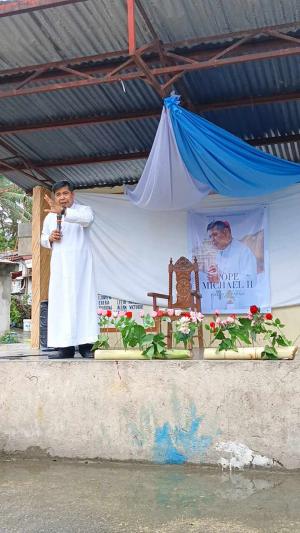


The Funny Pharmacy
A joyful mind maketh age flourishing: a sorrowful spirit drieth up the bones. - Proverbs 17:22

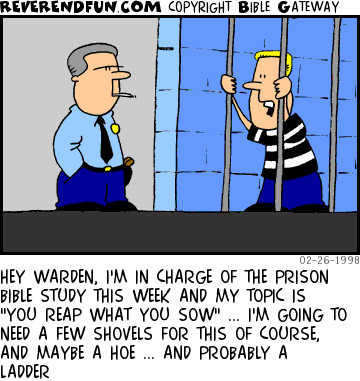




Frequently Asked Questions

What is this evidence for God's existence, apart from the Bible?
There are many indications, the chief of which I shall give you very briefly:
-
The first is from causality. The universe, limited in all its details, could not be its own cause. It could no more come together with all its regulating laws than the San Francisco Harbor Bridge could just happen, or a clock could assemble itself and keep perfect time without a clock-maker. On the same principle, if there were no God, there would be no you to dispute His existence.
-
A second indication is drawn from the universal reasoning, or if you wish, intuition of men. The universal judgment of mankind can no more be wrong on this vital point than the intuition of an infant that food must be conveyed to the mouth. The stamp of God\'s handiwork is so clearly impressed upon creation, and, above all, upon man, that all nations instinctively believe that there is a God. The truth is in possession. Men do not have to persuade themselves that there is a God. They have to try to persuade themselves that there is no God. And no one yet, who has attained to such a temporary persuasion, has been able to find a valid reason for it. Men do not grow into the idea of a God; they endeavor to grow out of it.
-
The sense of moral obligation confirms these reasons. In every man there is a sense of right and wrong. A man knows interiorly when he is doing wrong. Something rebukes his conduct. He knows that he is going against an inward voice. It is the voice of conscience, dictating to us a law we did not make, and which no man could have made, for this voice protests whether other men know our conduct or not. This voice is often quite against what we wish to do, warning us beforehand, condemning us after its violation. The law dictated by this voice of conscience supposes a lawgiver who has written his law in our hearts. And as God alone could do this, it is certain that He exists.
-
Finally, justice demands that there be a God. The very sense of justice among men, resulting in law-courts, supposes a just God. We did not give ourselves our sense of justice. It comes from whoever made us, and no one can give what he does not possess himself. Yet justice cannot always be done by men in this world. Here the good often suffer, and the wicked prosper. And, even though human justice does not always succeed in balancing the scales, they will be balanced some day by a just God, who most certainly must exist.
For answers to more frequently asked questions, click here: https://www.vaticaninexile.com/frequently_asked_questions.php
The Pope Speaks: Pope Pius XII
Munificentissimus Deus
Defining the Dogma of the Assumption

Christ’s faithful, through the teaching and the leadership of their pastors, have learned from the sacred books that the Virgin Mary, throughout the course of her earthly pilgrimage, led a life troubled by cares, hardships, and sorrows, and that, moreover, what the holy old man Simeon had foretold actually came to pass, that is, that a terribly sharp sword pierced her heart as she stood under the cross of her divine Son, our Redeemer. In the same way, it was not difficult for them to admit that the great Mother of God, like her only begotten Son, had actually passed from this life. But this in no way prevented them from believing and from professing openly that her sacred body had never been subject to the corruption of the tomb, and that the august tabernacle of the Divine Word had never been reduced to dust and ashes. Actually, enlightened by divine grace and moved by affection for her, God’s Mother and our own dearest Mother, they have contemplated in an ever clearer light the wonderful harmony and order of those privileges which the most provident God has lavished upon this loving associate of our Redeemer, privileges which reach such an exalted plane that, except for her, nothing created by God other than the human nature of Jesus Christ has ever reached this level.
The innumerable temples which have been dedicated to the Virgin Mary assumed into heaven clearly attest this faith. So do those sacred images, exposed therein for the veneration of the faithful, which bring this unique triumph of the Blessed Virgin before the eyes of all men. Moreover, cities, dioceses, and individual regions have been placed under the special patronage and guardianship of the Virgin Mother of God assumed into heaven. In the same way, religious institutes, with the approval of the Church, have been founded and have taken their name from this privilege. Nor can we pass over in silence the fact that in the Rosary of Mary, the recitation of which this Apostolic See so urgently recommends, there is one mystery proposed for pious meditation which, as all know, deals with the Blessed Virgin’s Assumption into heaven.
This belief of the sacred pastors and of Christ’s faithful is universally manifested still more splendidly by the fact that, since ancient times, there have been both in the East and in the West solemn liturgical offices commemorating this privilege. The holy Fathers and Doctors of the Church have never failed to draw enlightenment from this fact since, as everyone knows, the sacred liturgy, “because it is the profession, subject to the supreme teaching authority within the Church, of heavenly truths, can supply proofs and testimonies of no small value for deciding a particular point of Christian doctrine.”
In the liturgical books which deal with the feast either of the dormition or of the Assumption of the Blessed Virgin there are expressions that agree in testifying that, when the Virgin Mother of God passed from this earthly exile to heaven, what happened to her sacred body was, by the decree of divine Providence, in keeping with the dignity of the Mother of the Word Incarnate, and with the other privileges she had been accorded. Thus, to cite an illustrious example, this is set forth in that sacramentary which Adrian I, our predecessor of immortal memory, sent to the Emperor Charlemagne. These words are found in this volume: “Venerable to us, O Lord, is the festivity of this day on which the holy Mother of God suffered temporal death, but still could not be kept down by the bonds of death, who has begotten your Son our Lord incarnate from herself.”


St. Francis de Sales' Introduction to the Devout Life
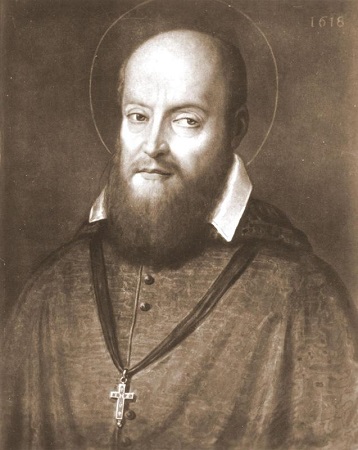
CHAPTER XVI
Eighth Meditation - On Paradise
Preparation.
1. Place yourself in the presence of God.
2. Invoke His aid.
Considerations.
1. Represent to yourself a lovely calm night, when the heavens are bright with innumerable stars: add to the beauty of such a night the utmost beauty of a glorious summer’s day,—the sun’s brightness not hindering the clear shining of moon or stars, and then be sure that it all falls immeasurably short of the glory of Paradise. O bright and blessed country, O sweet and precious place!
2. Consider the beauty and perfection of the countless inhabitants of that blessed country;—the millions and millions of angels, Cherubim and Seraphim; the glorious company of Apostles, martyrs, confessors, virgins, and saints. O blessed company, any one single member of which surpasses all the glory of this world, what will it be to behold them all, to sing with them the sweet Song of the Lamb? They rejoice with a perpetual joy, they share a bliss unspeakable, and unchangeable delights.
3. Consider how they enjoy the Presence of God, Who fills them with the richness of His Vision, which is a perfect ocean of delight; the joy of being for ever united to their Head. They are like happy birds, hovering and singing for ever within the atmosphere of divinity, which fills them with inconceivable pleasures. There each one vies without jealousy in singing the praises of the Creator. “Blessed art Thou for ever, O Dear and Precious Lord and Redeemer, Who dost so freely give us of Thine Own Glory,” they cry; and He in His turn pours out His ceaseless Blessing on His Saints. “Blessed are ye,—Mine own for ever, who have served Me faithfully, and with a good courage.”
Affections and Resolutions.
1. Admire and rejoice in the Heavenly Country; the glorious and blessed New Jerusalem.
2. Reprove the coldness of your own heart for having hitherto so little sought after that glorious abode. Why have I so long lingered indifferent to the eternal happiness set before me? Woe is me that, for the sake of poor savourless earthly things, I have so often forgotten those heavenly delights. How could I neglect such real treasures for mere vain and contemptible earthly matters?
3. Aspire earnestly after that blessed abode. Forasmuch, O Dear Lord, as Thou hast been pleased to turn my feet into Thy ways, never will I again look back. Go forth, my soul, towards thy promised rest, journey unweariedly to that hoped-for land; wherefore shouldest thou tarry in Egypt?
4. Resolve to give up such and such things, which hinder you on the way, and to do such others as will help you thitherwards.
Conclusion.
1. Give thanks, offer yourself, pray.
Saints from East and West
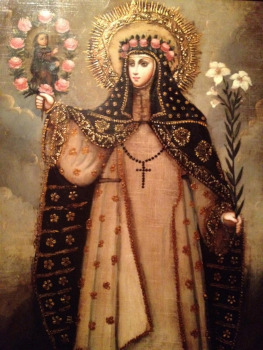
August 30 - Saint Rose of Lima
Asia, Europe, and Africa had been watered with the blood of many martyrs and adorned for ages with the shining example of innumerable saints, whilst the vast regions of America lay barren till the faith of Christ began to enlighten them in the sixteenth century, and this maiden appeared in that land like a rose amidst thorns, the first-fruits of its canonized saints. She was of Spanish extraction, born at Lima, the capital of Peru, in 1586, her parents, Caspar de Flores and Maria del Oliva, being decent folk of moderate means. She was christened Isabel but was commonly called Rose, and she was confirmed by St Toribio, Archbishop of Lima, in that name only. When she was grown up, she seems to have taken St Catherine of Siena for her model, in spite of the objections and ridicule of her parents and friends. One day her mother having put on her head a garland of flowers, to show off before some visitors, she stuck in it a pin so deeply that she could not take off the garland without some difficulty. Hearing others frequenly commend her beauty, and fearing lest it should be an occasion of temptation to anyone, she used to rub her face with pepper, in order to disfigure her skin with blotches. A woman happening one day to admire the fineness of the skin of her hands and her shapely fingers, she rubbed them with lime, and was unable to dress herself for a month in consequence. By these and even more surprising austerities she armed herself against external dangers and against the insurgence of her own senses. But she knew that this would avail her little unless she banished from her heart self-love, which is the source of pride and seeks itself even in fasting and prayer. Rose triumphed over this enemy by humility, obedience, and denial of her own will. She did not scruple to oppose her parents when she thought they were mistaken, but she never wilfully disobeyed them or departed from scrupulous obedience and patience under all trouble and contradictions, of which she experienced more than enough from those who did not understand her.
Her parents having been reduced to straitened circumstances by an unsuccessful mining venture, Rose by working all day in the garden and late at night with her needle relieved their necessities. These employments were agreeable to her, and she probably would never have entertained any thoughts of a different life if her parents had not tried to induce her to marry. She had to struggle with them over this for ten years, and to strengthen herself in her resolution she took a vow of virginity. Then, having joined the third order of St Dominic, she chose for her dwelling a little hut in the garden, where she became practically a reclues. She wore upon her head a thin circlet of silver, studded on the inside with little sharp prickles, like a crown of thorns. So ardent was her love of God that as often as she she spoke of HIm the tone of her voice and the fire which sparkled in her face showed the flame which consumed her soul. This appeared most openly when she was in presence of the Blessed Sacrament and when in receiving It she united her heart to her beloved in that fountain of His love.
God favoured St Rose with many great graces, but she also suffered during fifteen years persecution from her friends and others, and the even more severe trial of interior desolation and anguish in her soul. The devil also assaulted her with violent temptations, but the only help she got from those she consulted was the recommendation to eat and sleep more; at length she was examined by a commission of priests and physicians, who decided that her experiences, good and bad, were supernatural. But it is permissable to think that some of them, if correctly reported, were due to natural physical and psychological causes. The last three years of her life were spent under the roof of Don Gonzalo de Massa, a government official, and his wife, who was fond of Rose. In their house she was stricken by her last illness, and under long and painful sickness it was her prayer, "Lord, increase my sufferings, and with them increase thy love in my heart." She died on August 24, 1617, thirty-one years old. The chapter, senate, and other honourable corporations of the city carried her body by turns to the grave. She was canonized by Pope Clement X in 1671, being the first canonized saint of the New World.
The mode of life and ascetical practices of St Rose of Lima are suitable only for those few whom God calls to them; the ordinary Christian may not seek to copy them, but must look to the universal spirit of heroic sanctity behind them, for all the saints, whether in the world, in the desert, or in the cloister, studied to live every moment to God. If we have a pure intention of always doing His will we thus consecrate to Him all our time, even our meals, our rest, our conversation, and whatever else we do: all our works will thus be full.

Advice You Can Bank On
A Catholic Perspective On Finances
Why We Should Live Simply (continued from July 2023 article)
Separating Fact From Fiction
Many libraries have sections for books that are fiction, and sections for those that are nonfiction. It is taken for granted that people who classify books know which is which. But it isn't always that simple.
If someone had published a book in the early part of 1912 about the world's largest ship and how it was built in such away as to make it unsinkable, every library in the country would probably have classified it as fact. But what everyone believed to be true was proven to be false on April 15 of that year, when the Titanic sank during its maiden voyage from England to New York City.
Down through the centuries, many people have accepted things to be fact that later turned out to be untrue. For example, at one time everyone knew for certain that the world was flat, and that the sin traveled around the earth every day. Today almost everyone believes those two things to be fiction.
It was not only in the past that people have believed things to be fact that turned out to be fiction. That is still happening today. Believing something to be true and accepting it as fact when it is fiction can be very dangerous. More than dangerous-it can be fatal, as the people on the Titanic learned too late.
Here are a few things many people accept as fact today regarding the modern world, but which we believe to be untrue.
-
You can turn back the clock.
-
The world is no more wicked today than it has always been.
-
If you are born again, you can control modern inventions and use them to God's honor.
You can't turn back the Clock
“You can't turn back the clock.” That is often said with finality. We have all heard it again and again. But perhaps it is time to question whether the statement is even true.
In one sense, of course, it is true-in the sense that we cannot undo what has already been done. For example, I got a bad start today. I'm not pleased with that, and I wish I had gotten out of bed earlier. Here it's already 10:30am and I have accomplished very little. Can I get back in bed and set the alarm (after I turned back the clock) and have it go off at 5:00? Of course not. Everyone knows that. But does that mean I must continue to get up late? We cannot undo the past, but we can do something about the present and the future.
Let's look at the Old Testament for an example of a man who did not resign himself to a bad situation by saying, “You can't turn back the clock.” When King Josiah (II Kings 22,23) found the lost book of the law in the temple, he might have said, “Hmmm - we sure have made some serious mistakes in the past. Others have made most of them before my time, and I have inherited them. We have made most of them before my time, and I have inherited them. We have let the temple fall into disrepair. There is idol worship all through the land. We have not kept the law or the yearly feasts of the Lord for years. Some of the results are just sickening. But we can't turn back the clock.”
To King Josiah's credit, he did not say these words. Instead, he accepted responsibility for the present and demonstrated godly concern for the future. It is enough that wrong decisions and bad choices have been made in the past. There is no excuse for continuing to make them.
Satan is a liar. He has spread around many lies. He wants us to be influenced by them, and even to believe them and spread them to others. “we can't turn back the clock” is surely one of his lies designed to persuade people to accept situations they actually could and should do something about. The statement does contain some truth, as we have pointed out, as Satan's lies usually do. He loves to mix truth and untruth – maybe even a lot of truth. As long as the overall conclusion, the final deduction, is false, he is satisfied.
Let's go over this again. We can't turn back the clock and undo what has been done. For example, we can't undo the public school movement which gave the government the responsibility of educating children. We can't undo that, but we can do something about it for ourselves and our children, recognizing that God has made parents responsible for their children.
Another example is what has happened much more recently in the modern concept of family size. Today parents who have more than one or two children are seen as having a large family. We can't undo the liberal thinking, the birth control inventions. Or the social changes that have brought this to pass, but we absolutely must find ways, to do it, or else suffer immeasurable spiritual loss.
King Josiah found ways to turn back the clock. He repaired the neglected temple. He had the law read aloud to all the people and instructed them in God's ways. He restored the sacrifices and offerings in the temple. He reintroduced the yearly feasts. He tore down all the idols and high places throughout the land. He was the victim of many wrong choices made by others, but he did not see that as an excuse to continue living in the way that was not pleasing to God.
In the same way, we too can “turn back the clock,” making choices by the grace of God that will lead to repentance and God's favor. Someone may ask, “Of course we should not accept decay in moral issues such as schooling and limiting of family size. But what does that have to do with living simple?”
The two may be more connected than we have been led to believe. Modern inventions have gone hand in hand with drastic social changes. Large families made good sense in a setting where there were not so many labor - saving devices. Children were needed and were seen as a blessing. They had a chance to grow up feeling needed and appreciated, an atmosphere that is so important to a growing child. Children grew up learning by doing, and being taught by their parents in a family setting. But that was in a setting where Mother stayed in the home. (and father usually did, too) – she had to, for without the modern labor – saving devices, she was needed there. The labor – saving devices not only freed her to leave the home to seek a career, but also created a need for more income to support a push-button/cash economy lifestyle.
The place of children in the family is not only one aspect of the far reaching changes that have been brought about by modern technology. Today's lifestyle is a complex mosaic of many of these changes. It is admittedly difficult to determine what has been the cause of what, and what has been the effect of what. But we maintain that since the moral decay of these last days has gone hand in hand with lifestyle changes made possible by technology, the connection between the two needs to be examined with great care. We should do this with an attitude that wherever the two are tied together to our harm, by the grace of God we can and will turn back the clock.

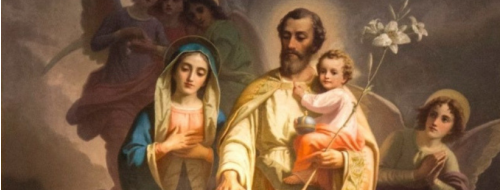 Family Matters
Family Matters
Losing a Baby And Finding Hope Part 5
Taken from the pages of the book “A Child At Any Cost” Edited and shortened for this article.
A Continuation from the July '23 issue of the Olive Tree
Coming to terms with my loss
It is now more than a year since I lost my baby. Certain times and situations have been very difficult for me. The date when my baby would have been born was one of them. It was difficult to face expectant mothers in the streets. Whenever I went shopping all the pregnant moms in the town seemed to crowd into the same shop. It was especially hard if their pregnancy was at the stage that I would have been at had my baby lived.
Insensitive remarks from well-meaning friends hurt very much. People seemed to assume that it had been a relatively minor upset and that I would be back to my normal self in a matter of weeks. Some few months after I lost my baby a friend asked how I was. I opened my heart to her and shared a little of my continuing pain. She seemed surprised that I was still feeling like this and almost shocked that I hadn't got over it completely-and this was around the time by baby would have been due! Unless people have been through an experience like this themselves it is hard for them to realize how devastating it is to lose a baby, or quite how long it takes to come to terms with this form of bereavement! And it is much harder for those who have been longing for a baby for ages and have no assurance that they will ever have another pregnancy.
Yet, I can honestly state now that I am not only contented but also joyful. God has healed my broken heart. The scar remains and perhaps it will persist until I die, but my terrible aching pain has been eased away.
Scars can irritate and mine still flares up from time to time but the nagging pain no longer overwhelms me, This is not because I am superhuman. Far from it! I am aware only to well of my weaknesses and faults. The change in my attitude is something that God has brought about within me.
God's Transformation
God promised in the Bible that in all tings He works for the good of those who love Him. (Romans 8:28). With all my heart I believe this to be true. I still do not know why I had to lose my baby – for all I know it might have been abnormal or handicapped in some way. I know see that the reason for my loss is not really as important as I once thought it was. I am now confident that God can take any situation that is tragic from a human point of view and He can transform it into a platform form which He can display His grace, power, and even His great love. God can ultimately bring good out of any situation provided we allow Him to. We must be willing to let go of all the “whys” of self-pity, and begin to praise Him for the past good He has done for us and for what He can do in and through us in the future. I believe that the best place to bring questions, anger, resentment, and self-pity is right into God's presence in prayer. God knows already how we feel and it is amazing to realize that He understands us so well.
In speaking of Jesus, the Bible explains that “For we have not a high priest, who can not have compassion on our infirmities: but one tempted in all things like as we are, yet without sin.” (Hebrews 4:15).
An immediate result of the loss of my baby was that my maternal instincts had been aroused so much that I now longed for a baby twenty times more than I had before. I had tasted the ambrosia of pregnancy and assumed that God would not have let the medical treatment be successful once if it was not going to work another time. I was impatient to start the treatment and conceive again. There was no question in my mind about whether I would try again or not, the only question was when.
What Next?
I was sure the treatment would work immediately – even on the first course. But it didn't work. And it was hard to grasp what was being said after the sixth course of treatment failed, “There is o point in continuing – it's obviously not going to work this time!” was the medical verdict. Again I agonized with “whys?”. I could not understand from a medical point of view why the treatment worked the first time but not the second. I did not receive an answer that satisfied my medical mind other than the explanation that “infertility is a complex business.” I was told that the only option open to us if we wanted a baby of our very own now was in–vitro fertilization.
My Husband and I thought and prayed a great deal about this suggestion. Although hope was offered, neither of us felt totally happy about it. We sensed a certain restraint about it, and had no deep peace that it was right for us to go ahead with even more treatment. Our decision not to try IVF is explained in a later article.
Yet our decision to stop treatment for infertility was especially difficult for me. My husband was convinced that it was time to call a halt, He felt that my emotions and hormones had received sufficient battering in the last two years, and that I had coped with more than enough.
Our decision was hard to accept at first. It seemed so final. I was still mourning the loss of my baby and now it seemed as if that child would never be replaced by another. However, once a couple of months had passed and my hormones had settled down, I felt like a new woman. I experienced a great release of tension. I was free again – no more treatment, no more visits to the hospital, and no more “trying for a baby”. As I was able to accept our childlessness, so healing came to me.
My intense longing for a child immediately after losing my baby diminished to a level with which I could cope. I was able now to look towards a future that was not tinged with the sorrow of realizing tht we would probably remain childless. I still believe that God is a God that can perform miracles. I do not know what the future holds for me. It is enough to know that it is in God's loving hands.
As I look back over the past few years and wonder why all this had to take place in my life, I do not know the answers. But I know I have a new strength, a new dependence on God, and a new capacity to accept His plan for my life as being perfect. I am excited about the future. I know it will not be free from pain but I have proved in experience that God's grace will be sufficient to bring me through anything that may happen to me.

Lamp and Light Commentary

"Thy word is a lamp to my feet, and a light to my paths." (Psalms 119:105)
Genesis 15-24 Abraham And Lot
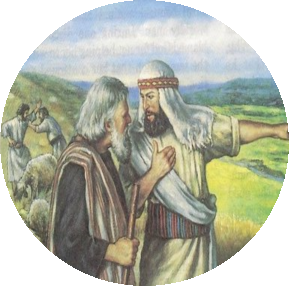
One day God took Abraham outside his tent and told him, “Look up to heaven and number the stars, if thou canst. And he said to him: So shall thy seed be.” [Genesis 15:5]. At that time Abraham didn't even have one child. There are millions of stars in the sky. And it says that Abraham believed the Lord [verse 6]. The word “believed” there in the original Hebrew is 'aman' from which we get the English word 'Amen'. Which means 'I believe it will be so' So when God told Abraham that his seed would be like the stars of heaven, Abraham just said, “Amen, I believe it will be so.” That's it. And it was fulfilled. Today, the children if Abraham (physically and spiritually number in millions.
Faith means saying “Amen” when God has said something to you. Faith is always based on the word of God. “Faith then cometh by hearing; and hearing by the word of Christ.” [Romans 10:17]
You can't have faith, if you don't listen to God.
Abraham heard God first. Then he said “Amen”.
Nowadays, many believers are found to say that they have faith for things about which God has said nothing. They say: “I have faith that God will give me a Mercedes-Benz car. And I believe it's going to be black in color”. That's not faith That is presumption. It is tempting God. Faith can be born only after hearing God speaking to us first. Only then can we say, “Amen. It shall be so.” If you remember this, you will be saved from presumption and from counterfeit faith”. Faith begins with God's promise and not with our desires. That which begins with our own desires will only lead to Babylon. What begins with God will lead to Jerusalem. Once God has spoken, we must keep on saying, “Amen” to it, all through our life, no matter how long God takes to fulfill His Word.
But in chapter 16, we read that Sarah was impatient. She suggested to Abraham to have children through Hagar, her handmaid [16:2] What did Abraham do then? Unfortunately he said, “Amen” to Sarah too. That caused a problem for Abraham's descendants that has now lasted for 4000 years.
What are we to learn from this incident? Just this that we must never say “Amen”, to man's word, when God has told us something else. God can solve any problem we have, without our having to adopt carnal methods. We don't need Sarah's advice. God is well able to do what He has promised.
Thus Ishmael was born [16:15]. Notice something here. When Ishmael was born, Abraham was 86 years old. The next verse carries on from when Abraham was 99 years old. [16:16 & 17:1]. What happened during those 13 years? The Lord was silent. The Lord appeared to Abraham again only when he was 99, after a silence of 13 years. It is as if the Lord was saying to him, “Did you say 'Amen' to Sarah's suggestions? Then you will have to learn a painful lesson. I won't speak to you for 13 years, until you learn to value My voice more than anyone else's” Yes, God is very strict. He teaches us some lessons in a very hard way at times-for otherwise the lesson won't sink in. 13 years is a long time to live without hearing God. But Abraham learnt his lesson by then and never and we do not see him ever consulting Sarah again-not even when he was told to sacrifice Isaac much later.
God did not give up on Abraham. He now told him, “Your name will no longer be called Abram (exalted father) but your name will be Abraham (father of the multitude). You won't just have that name; you will actually be the father of a multitude.” Abraham said, “Amen” once again-and within a year, he got a son-when things appeared hopeless. God gave him a son because he finally learned to say, “amen” to God alone. Abraham had learned his lesson.
God also told him at this time to circumcise every male member of his household. Circumcision under the old covenant was a a cutting off of the flesh. Under the new covenant, it symbolized “no confidence in the flesh. “ “For we are the circumcision, who in spirit serve God; and glory in Christ Jesus, not having confidence in the flesh.” [Philippians 3:3]. God was telling Abraham, “You must not depend on yourself. Trust in Me.”
We read a little it about Abraham's hospitality in Chapter 18. We're told in Hebrews 13:2 to be hospitable to strangers, “for by this some, being not aware of it, have entertained angels”. That is referring to Chapter 18. A godly man is always hospitable, warm and good-even to strangers.
Then in Chapter 18 and 19, we read of Lot getting into trouble again. The Lord told Abraham that He was going to destroy Sodom and Gomorrah for its sins. Again Abraham was concerned about Lot. Lot still hadn't learned a lesson. After being captured as an enemy, he went back to Sodom to make more money. But Abraham didn't judge Lot. As a godly man, he prayed for Lot to try and save his life. This is the first recorded intercession in the Bible and it is for the salvation of souls. Lot was saved as a result of Abraham's prayers. But his wife was left behind as a pillar of salt.
Lot's is a sad story. He lost his wife and both his sons-in-law, and all his property, in his pursuit for wealth. Finally he had to go as a pauper to the very place where God had told him to go in the first place! His daughters then committed incest with him and bore two sons-Ammon and Moab [19:37-28]. From them came the Ammonites and the Moabites who fought with Israel constantly.
In contrast to the way Lot brought up his children, we read the Lord Himself testifying concerning Abraham that Abraham would “command his children and his household after him ” [18:19]. God also said there that this was why He could fulfill all His promises for Abraham. God cannot do much for many people today, because they cannot control their children in their own home!
In Chapter 20, we see Abraham failing a second time in the same area of telling lies to a heathen king in order to save his life. He was even willing to allow his wife to go to bed with another man to save his own life. How weak a man he was-just like us. But God was good to Abraham and saved Sarah from being touched by Abimelech. It is interesting to see that God praises a heathen king for “the integrity of his heart” [20:6]. God told him that is was the integrity of his heart that made God stop him from committing adultery with Sarah. God will help any one who has integrity of heart today, in the same way as He helped that heathen king 40 centuries ago!
We see something wonderful in 20:17-21:2. We see Abraham praying here for many barren women in Abimelech's household, at a time when his own wife Sarah was barren.
It requires much largeness of heart to pray that others might get what we ourselves have not received from God.
But when Abraham prayed like that, not only did all those women receive children, barren Sarah also conceived and gave birth to Isaac. “The liberal soul shall be made fat: and he that watereth shall be watered also himself. ” [Proverbs 11:25]. When Job prayed for others, God blessed those others and Job as well [Job 42:10].
But Abraham had waited patiently for 25 years before he got what God had promised him. King Abimelech now heard of Isaac's birth and came to Abraham and told him, “God is with thee in all that thou dost.” [21:22]. When we are faithful to the Lord, the Lord will make even the heathen recognize that he is with us.
In Chapter 22 we read of the first time in the Bible that God testifies about a man saying, “Now I know that you fear Me.” that was when Abraham offered up Isaac. Abraham was about 125 years old at this time, and God tested him again. This time it was whether Abraham still loved God supremely, as at the beginning. God told him, “Sacrifice your son Isaac. I am not asking you to do it tomorrow morning. No. Do it on Mount Moriah-three days journey away.. take those three days to think about it.” god never asks us to do things in a hurry. Abraham walks for three days and counts the cost and lays Isaac on the altar, and says, “Lord here you are. I love You more then my dearest earthly possessions.”
That showed Abraham's dedication and Isaac's dedication too. Isaac, as a 25 year old young man was much stronger than 125 year old Abraham. Abraham would never have been able to tie Isaac on the altar if Isaac had not been willing. That shows how Abraham had taught his son to obey him. Blessed is the man who can bring up his children in such a way that even if he were to say to them. I am going to offer you to God now. Lie down here,” they will lie down and say, “Ok. Dad. Go ahead.”
Abraham called this an act of “worship” to God. [22:5]. This is the first time that the word worship is mentioned in scripture- and this is what true worship is. The father seeks for such worshipers even today.
God saw Abraham's devotion to Him and said, “now I know that thou fearest God ” [22:12]. The first time it is recorded in Scripture that a man feared God is when a man obeyed God totally saying, “God, I love you more than my dearest earthly possessions”. Abraham had left Ur 50 years earlier because he had loved God more than his own family. 50 years later his love for God had not waned even slightly. What an example to follow! Blessed are you if you can go this way all the days of your life.
God was was so delighted with Abraham's attitude here, that he commanded the temple to be built on this very spot 1000 years later. [2 Chronicles 3:1]. Yes, God's house is built even today by those who fear and worship God like Abraham did.
ISAAC SON OF ABRAHAM A "TYPE" OF JESUS CHIRST
It was here on Mount Moriah that Abraham caught a glimpse of the heart of God Who would one day offer His Son as a sacrifice 200 years later. Jesus referred to this in John 8:56: “Abraham your father rejoiced that he might see my day: he saw it, and was glad.”
Bishop Theodoret, Bishop of Cyrrus from 393-466 AD said this, when commenting on the book of Hebrews: “Figuratively speaking, he did received him back, that is, by way of a symbol and type of the resurrection. Put to death by his father's zeal, he came back to life at the word of the one who prevented the slaughter. In him the type of the saving passion was also prefigured. Hence the Lord also said to the Jews, 'Your father Abraham rejoiced at the prospect of seeing my day; he saw it and was glad.''
Lets see some of the comparisons between the "offering up" of Isaac in sacrifice found in Genesis 22:1-18 and the Passion and Resurrection of Jesus Christ:
-
Both are promised-childs, miraculously conceived
In their respective accounts, both Jesus and Isaac are promised-childs, miraculously conceived gifts from God (neither mother was supposed to be able to give birth). This is relevant because few figures share this property, and it is central to both Jesus and Isaac.
-
Verses on Jesus's being miraculously conceived:
• Luke 1:30-35 -
Verses on Isaac's being a miraculously conceived:
• Genesis 18:9-10 , Genesis 21:1-4 -
Aside from Isaac and Jesus, there are only six other miraculous births in the Bible, the others being Jacob & Esau, Samson, the Shunammite woman‘s son (2 Kings 4), Samuel, and John the Baptist.
-
Both are called their father's special “only son”
In both stories, Jesus and Isaac are explicitly identified as their father's special “one and only son.” This is relevant because few father-son relationships are described this way in the Biblical texts, and yet this unique specialness of the son to their father is central to both the story of Isaac and Jesus.
-
Verses on Jesus being God's “only son”:
• John 3:16
• Romans 8:32
• Romans 5:10
• 1 John 4:9-10 -
Verses on Isaac being Abraham's “only son”:
• Genesis 22:2, 12
-
Both are to be sacrificed by their loving father
In their respective accounts, both Jesus and Isaac were to be sacrificed by their father. This is relevant because few figures in story or history share this property, and yet it is a defining feature of Isaac and Jesus.
-
Verses on Jesus being sacrificed by his loving Father.
1 John 4:9-10
John 3:16
Romans 8:32
-
Verses on Isaac being sacrificed by his loving Father.
Genesis 22:2
-
Both are to be sacrificed in the same place (Moriah)
In their respective accounts, Jesus and Isaac were to be sacrificed in the same location (hills of Moriah). This is relevant because no other Biblical figures share this property, and God commanded Abraham to travel about 50 miles to sacrifice Isaac at just this location, without ever offering an explanation. (It is as if God expected something special to happen there later?)
-
Verses on Jesus being crucified in the location of Moriah:
John 19:17 (cf. Mk 15:22, Mt 27:33, Lk 23:33) This is relevant because this hill (Golgotha) was a hill of Moriah. We know this because the hill Golgotha and the Temple (in Jerusalem) were 300 meters apart, with the latter being built on a hill in Moriah (called Mt. Moriah), and the former also being a hill in Moriah (part of the same range).
2 Chronicles 3:1
-
Verses on Isaac being Abraham's “only son”:
Genesis 22:2
-
Both are to be a sacrificial lamb to God (on wood)
In their respective accounts, both Jesus and Isaac were to be sacrificial lambs to God.
-
We know Jesus was meant to be a sacrificial lamb for two reasons:
• Jesus was crucified during passover, which is when Jews were to sacrifice their unblemished lamb.
• Texts report it explicitly:◦ John 1:29,36
◦ 1 Peter 1:18 -
We know Isaac was meant to be a sacrificial lamb because of context:
◦ Genesis 22:1,7-8
-
Both carry their own wood up on their back to die on
In their respective accounts, both Jesus and Isaac were ironically expected to carry the very wood up the hill that they were to be sacrificed on. This is relevant because no other Biblical figures share this property, and it is one of the few details given on the story of Isaac's being sacrificed, while also prominently featuring in the account of Jesus's death.
-
• Genesis 22:6
-
We know this because:
• Victims of crucifixion in general were expected to carry their cross as far as possible.
• It is reported explicitly in John 19:16-17
-
Both voluntarily submitted to their being sacrificed
In their respective accounts, both Jesus and Isaac (much stronger than Abraham) submitted to their father's will to be sacrificed, without resisting. This is relevant because it is hardly expected in such a case, and yet is an essential and unique characteristic of how Jesus and Isaac went to die.
-
We know Jesus did not resist for two reasons.
• The reports of Jesus' death are numerous and details, and yet there is no indication that he tried resisting.
• Quite the contrary, the reports consistently identify him as not resisting (not in his arrest [Mt 26:50] or in his trial either).
◦ Acts 8:32, 35
◦ Mt 26:50
-
Isaac was perfectly capable of fighting back (he was the one who carried all the wood up on his back).
-
Both narratives conclude: God will provide
In both the story of Jesus and Isaac, the account ends with the message that “God will provide,” specifically he will provide sacrificial replacement so his loved ones do not. This is relevant because, while the analogue to Jesus shifts from Isaac to the ram, this was necessary to incorporate the final element: the substitionary sacrifice. The text emphasizes the ram was killed “in the place of his son.” The text really seemed to want to highlight this feature, saying they sacrificed the ram "in Isaac's place"; the story needed to say that.
-
In the case for Jesus, he is sacrificed and dies for our sins. Romans 3:25
-
Genesis 22:12-14
-
Both fathers anticipated their son's resurrection
In both stories, Jesus and Isaac were expected by their fathers to be resurrected by God.
-
Jesus's father in this case is God, who being omniscient knew. Several texts also testify to God's awareness.
-
There are three reasons to think Abraham believed this of Isaac:
• Abraham did not object, and Isaac did not worry or resist.
• Abraham expected them both to return.Genesis 22:5
• The whole situation was a test of Abraham's faith in God's promise just before:
Genesis 21:21 , Genesis 17:9
In other words, insofar as Abraham believed both…
• …that he would kill Isaac
• …that Isaac would live on to have children and continue Abraham's line,
Abraham obviously had to believe would raise Isaac from death. This was noticed by Jews long before.Hebrews 11:17-19


Books to feed your faith!
The Catholic Religion Proved By The Protestant Bible
$3.99
This work begins with covering 27 points and then proceeds to various doctrines of the Catholic Faith and proceeds to prove that the Protestant Bible supports Catholic doctrine. The work commences:Did Our Lord write any part of the New Testament or command His Apostles to do so? Our Lord Himself never wrote a line, nor is there any record that He ordered his Apostles to write; He did command them to teach and to preach. Also He to Whom all power was given in Heaven and on earth (Matt. 28-18) promised to give them the Holy Ghost (John 14-26) and to be with them Himself till the end of the world (Mat. 28-20). COMMENT: If reading the Bible were a necessary means of salvation, Our Lord would have made that statement and also provided the necessary means for his followers.
Scriptural Rosary
$4.00
Over a half a century ago, a devotion was introduced called the Scriptural Rosary. To the basic Rosary, readings from Sacred Scripture were added before each Hail Mary as an aid to meditation. This beautiful devotion is reproduced here to aid the faithful in meditating on these wonderful mysteries.
A Catholic Viewpoint on the Four Temperaments
$9.99
This is a compilation of information from several older works, which have been brought together to explain this most important consideration in the spiritual life. We begin with a short consideration from Father Scaramelli, who died in 1752. He wrote a four volume work, Directorium Asceticum, which is an excellent treatise on the spiritual life. He touches on the four temperaments briefly. We will expand with the thoughts of Father John Henry Schagemann CSSR from his work, Manual of Self-Knowledge and Christian Perfection. This work is in two parts the first on the Four Temperaments and the balance is a excellent summary of the spiritual life. The first part of this 1913 work is reproduced here. The balance of this work is inspired by Konrad Hock, who wrote The Four Temperaments. There is a great deal of interest in self-examination in these days and the four temperaments are a great guide to understanding ourselves, our strengths and our weaknesses. Some misuse this information in order to find an excuse for sin, but there is no excuse for sin. Knowing our temperament, we can know where our strengths and weaknesses lie and with the help of God over come our weaknesses and build upon our strengths The four temperaments are based upon the four humors ancient philosophers believed exist in the human body: Melancholy, (Melancholic) Phlem, (Plegmatic) Blood (Sanguine) Choler (Choleric or Billious) We begin with a test to determine our temperament, so we can know where we stand entering into our study.

$5.95


Simple Summer Gazpacho

INGREDIENTS:
2 pounds ripe roma tomatoes, halved and cored
1 small (1/2 lb) cucumber, peeled and seeded
1 medium green bell pepper, cored
1/2 small red onion, peeled
2 small garlic cloves (or 1 large clove), peeled
3 tablespoons olive oil
2 tablespoons sherry vinegar
1 teaspoon fine sea salt
1/2 teaspoon freshly-cracked black pepper
1/2 teaspoon ground cumin
1 thick slice of good white bread, soaked, crusts removed
optional garnishes: homemade croutons, chopped fresh herbs, a drizzle of olive oil, or any
leftover chopped gazpacho ingredients
DIRECTIONS:
Combine all ingredients together in a blender or food processor. Puree for 1 minute, or until
the soup reaches your desired consistency. Taste and season with extra salt, pepper and/or
cumin if needed.
Refrigerate in a sealed container for 4 hours, or until completely chilled.
Serve cold, topped with your desired garnishes.
Simple Watermelon Sherbet

3 cups seedless watermelon cubes, cut 1 inch in size and frozen solid
1/2 cup vanilla yogurt
DIRECTIONS:
2. Serve immediately for a frozen yogurt/soft-serve consistency. For a firmer consistency, freeze for 1 to 2 hours and then scoop. Leftovers may be frozen solid, but the sherbet will be very hard and impossible to scoop straight out of the freezer. Instead, place the container of frozen sherbet in the refrigerator to slowly soften for 3 hours before serving, at which point it should be scoopable.
Notes
A small (personal-sized) seedless watermelon will yield around 7 cups of watermelon cubes, enough for at least two batches of this recipe. I try to remove as many small seeds as possible while cutting my watermelon into cubes so that the seeds don't end up in the sherbet.
To freeze the watermelon cubes, place them in a single layer on a rimmed baking sheet and place in the freezer for at least 4 hours but preferably overnight. Make sure there's not excess watermelon juice on the pan or the cubes will freeze into a solid mass. I also prefer freezing the cubes on top of a piece of foil or parchment paper which makes it easier to release them from the pan later.
When making this sherbet, be sure to work quickly or the watermelon will start to thaw and the sherbet may become watery.
Video sermons and instructions: Timeless timely truths for living the Faith
The Necessity of Mortification
Assumption 2012
Show Me Your Scars
What are the Ten Commandments?
Vatican In Exile Podcasts
Family Theater
Family Theater was a program created to promote family unity and each week saw a drama illustrating the importance of family life and prayer. The main reason for the success of this series was undoubtedly due to the numerous Hollywood stars that participated.
Cast: Bing Crosby, Gary Cooper, James Stewart, Gregory Peck, Shirley Temple Director: Fred MacKaye, Dave Young, Joseph Mansfield, Richard Sanville, Jaime del Valle, Mel Williamson, Robert O’Sullivan, John Kelley Producer: Father Patrick Peyton, Bob Longenecker Host: Father Patrick Peyton Writer: True Boardman , Father Patrick Peyton Announcer:Tony LaFrano
Ranger Bill
Ranger Bill was a Christian radio adventure serial, and aimed at the younger generation. This turned out to be one of the most successful radio broadcasts, and with an amazing longevity of over twelve years. The very first fifteen minute episode was aired on October 2, 1950, but this later changed to a half hour episode, beginning May 14, 1954 and running right through until 1962.
Catechism Corner
Catechizing with a fresh perspective. Using the Holy Scriptures and the Catechism of the Council of Trent as foundational bases.
Lamp and Light Bible Study
Lamp and Light Bible Study is not a ‘theological’ study but a ‘life application’ study.
Our in house Priest will show that every single book of the Bible is interesting and has a message for us today. It deals with key aspects of the Christian life and speaks more to the heart than to the head.
Sunday Sermon
The Ave Maria Hour
The Ave Maria Hour first aired on April 26, 1935, on radio station WOR. It was presented by the Franciscan Friars of the Atonement to help the humanitarian work of St. Christopher’s Inn, and during that first show, Servant of God Father Paul of Graymoor talked about the charity involved in caring for the men of the Inn. In 1937, it was estimated that nearly 1 million listeners were tuning in each week, which resulted in large pilgrimages coming to Graymoor.
The popular Ave Maria Hour continued until 1969, encouraging and entertaining listeners. It was heard on more than 350 stations as well as on the Armed Forces Radio Service. Recorded in a studio in New York City and on the grounds of Graymoor, these dramatizations of the lives of the saints, stories from the Gospel, and inspiring accounts of faith received many awards for religious radio programs sponsored by the American Exhibition of Educational Radio and Television programs of Ohio State University. It received the Golden Bell Award in 1959, presented by Ed Sullivan on live television.
The Bible In Living Sound
THE BIBLE IN LIVING SOUND, the original dramatized audio Bible stories . . . really gets kids excited about the Bible! These 450 spiritually enthralling stories, re-enacted with music and lively sound effects, leave impressions of lasting beauty and wonder, putting the listener in the Red Sea at the crossing, beside David as he confronts Goliath, with Mary and Joseph in the stable, and there at the foot of the Cross. These stunning dramatizations captivate listeners of all ages as they are enriched by visualizing the values taught in God's Word. Listeners want to hear these audio Bible stories again and again.

Day Two
Creation Vs Evolution
The Order Of Events Doesn't Agree
People who believe in evolution do not believe the air around the earth had oxygen in it when the earth first existed. They believe that the air was very poisonous, mad up of gases like methane and ammonia, for example. If the air today was full of these gases, there would be no life on the planet.
Now why do evolutionists believe the first atmosphere had these poisonous gases? Well, because the substances (chemicals) that make up living things could not evolve if there was oxygen in the air. They would in a sense, “just burn up” and life from non-life would be impossible. You see, evolutionists believe that chemicals just came together by chance to make all the very complex substances (including DNA, which is really an information system and language system) that are part of living systems. But they also know that this could not happen if there was oxygen. And yet, for most living things, they need oxygen. And yet, for most living things, they need oxygen to live!
Now scientists have discovered oxygen in rocks they believe were supposedly part of the earth when the earth first existed. So, from their own evolutionary story, evolutionists have to accept that there must have been oxygen in the air from the beginning of the world – which is contradictory to their evolutionary worldview.
Heavier Than Air
Have you ever thought about why the air stays around the earth? Why doesn't the air just escape into space? If it did this, then we would have no air to breathe, and everything the earth by an invisible force called gravity. The remarkable thing is that scientists know gravity exist. They see it work – for example, if you throw something into the air, it will fall back to earth because the force of gravity brings it back to earth – but they don't really know why it works. They don't understand it.
When you hop on a scale to weigh yourself, the force of gravity pulls you down on the scale, and that is what gives you weight. When the astronauts went t the moon, they did not have much weight there because the force of gravity is much less on the moon. That is one reason why there is no air on the moon – there is not enough gravity for the air to stay there.
Air consists of particles called molecules that make up a number of different gases. If these particles are pulled down by this invisible force, then they must have weight. Scientists know that air has weight. But did you know the Bible had this information in it before scientists discovered it ? Job 28:25 states, “Who made a weight for the winds.” God told Job (who likely lived around the timeo Abraham) the air had weight!
Our Goldilocks Atmosphere
Other planets in our solar system, like Venus and Jupiter, have an atmosphere – but their atmospheres are full of poisonous gases. Only the earth has exactly the right atmosphere for life. In fact, it looks lie it was designed just right! That is what we would expect if God made the world. Actually, there is a word that describes the fact that the earth is just right in so many ways – just right the distance from the sun, just the right atmosphere, just the right substances like liquid water, and so on, that our planet has just the right conditions for life. This is called the “anthropic principle.”
Scientist who are evolutionists believe that if life evolved on earth, it must have evolved on other planets. The more they are able to send spacecraft to Venus, Mars, and some of the other planets in our solar system, the more they find that it is only on earth that everything is just right for life. These other planets all have poisonous gases, or they are too hot or too cold for life. God did not make life on other planets – only on earth. We will discuss this in more detail when we look at day four. However, evolutionists continue looking for life in outer space as they believe life had to evolve elsewhere in the universe. They can't believe life is special to earth because they reject that God is the Creator as the Bible tells us. These evolutionist believe that matter (of course, they don't ultimately explain where matter comes from) somehow has this ability to form life if the right conditions exist. But matter can never, and has never been observed to, form life by itself. Such a belief is called “naturalism.” which is in reality the religion of atheism. But life had to arise from an intelligent Creator; it can't come about by natural process.
Just Pure Air
Now air is important for many things. Birds would not be able to fly if there was no air, as it is the air that rushes over their wings as they flap them that makes them fly. We would not be able to have airplanes if there was no air. There would be no wind to keep us cool and bring rain if there was no air. When God first made this air, it must have been perfect. The cleanest that air could ever be. Sadly, today, a lot of the air in the world is polluted from cars, factories, and other activities of man that put poisonous gases and other substances into the air Because of the way w live, we can't help polluting the air. But we should try to keep it as clean as possible. After all, it is God's world, and we will learn, God told told man to look after it for Him. God set up the earth with the land, rain, air, and oceans to be a very complex system to keep conditions right for life to exist here. That's why it's so reassuring that God told Noah after the flood that, “While the earth remaineth, seedtime and harvest, cold and heat, summer and winter, night and day, shall not cease.”(Genesis 8:22)
He's Coming In The Air
One day something very important is going to happen in the air around the earth. Jesus Christ, the Creator of this air, is one day coming back to meet in the air those who love and serve Him. We read about this in the book of I Thessalonians 4:16-17, “For the Lord himself shall come down from heaven with commandment, and with the voice of an archangel, and with the trumpet of God: and the dead who are in Christ, shall rise first. Then we who are alive, who are left, shall be taken up together with them in the clouds to meet Christ, into the air, and so shall we be always with the Lord.”
When God was preparing the atmosphere for life, He knew that man would sin, and one day Jesus would ascend to heaven by going up into the atmosphere, and that He would return one day when He comes back with the saints of heaven to meet in the air with the saint still here on earth.
And when he had said these things, while they looked on, he was raised up: and a cloud received him out of their sight. And while they were beholding him going up to heaven, behold two men stood by them in white garments. Who also said: Ye men of Galilee, why stand you looking up to heaven? This Jesus who is taken up from you into heaven, shall so come, as you have seen him going into heaven.
(Acts 1:9-11)
Was Day Two Not 'Good?'
So on day two, we now have an earth that is still a watery blob, but there is an atmosphere around the earth, but no living things yet, and outer space, but with no other planets, moons, stars, or other heavenly bodies.
God has completed another part of the earth as He continues getting this earth ready for planets and animals, and ultimately humans, to live on it.
Genesis 1:8 ends with, “And God called the firmament, Heaven; and the evening and morning were the second day.”
Now notice that at the end of the second day, God doesn't say that it was “good,” as He does for the other five creation days. It could be because He didn't create anything totally new on day two. He just separated what was already created, as explained in earlier articles, and he was preparing for all that would happen on the next four days of creation. But regardless, while day two was not specifically called “good,” we know the day, and what God did on that day, was good because Genesis 1:31 tells us that everything God made at the end of the creative process was “Very good.” This, of course, would include day two and everything God did on that day.
When Were Angels Created?
I think it would be interesting at this stage to mention angels. Many Christians who have studied the Bible for a long time think that the angels, who are created beings, were made sometime early in the creation week. Perhaps on the first or second day. For instance, in exodus 20:11, we read that God made everything in six days. Presumably this included the angels, as we read in Colossians 1:16 that “in him were all things created in heaven and on earth, visible and invisible, whether thrones, or dominations, or principalities, or powers: all things were created by him and for him.”
The Bible doesn't tell us much about angels as it is primarily a book about God and His relationship with man. But we do know from passages such as Hebrews 1:14, that they were made for a purpose associated with this earth and the people that live here: “Are they (Angels) not all ministering spirits, sent to minister for them, who shall receive the inheritance of salvation?”
Many biblical scholars believe Job 38:7 is referring to all the angels who rejoiced when the foundations of the earth were laid, “when the morning stars sang my praises together, and all the sons of God made a joyful melody.” If so this passage couold be telling us that the angels saw God making the earth. This would also mean that Satan, who is a created angel, was one of those that sang for joy. If so, this would mean Satan's rebellion had to be after this time-in fact, after everything God had created was called “very good.” So when was Satan's rebellion? It's possible it could have been at the time he tempted Eve. Others think it would have had to happen before he tempted Eve and this act was what came from the rebellion. We don't know for sure, but it's interesting to think about this.
God had now finished the second day of creation.

Catechism Catch-Up
“Dwell With Them According To Knowledge”

Speech is a gift given to humans but basically denied to all the rest of the natural world. It is the tangible part of us that is also common among the spirit beings. (Angels, devils, and all heavenly beings.)
Present studies report we all say about 16,000 words in a day, some more and some less. Regardless, we do take talking for granted, it comes so natural. The question is not whether or not we talk, the question is if we communicate.
Students of relationships agree that when relationships are good, then communication is easy, trust is evident and mistakes are allowable. A courting couple often finds they can just talk and talk while the hours quickly fly by. It is also true that when communication is thorough and respectful, then relationships are the most likely to be improved.
When life moves to everyday living, ease in communication may change. When a problem arises, strangely, a couple who found it easy to talk may later find it easier to steer around the problem. Some people withdraw from relationships when they become afraid of being hurt. Some clam up because they were hurt. Others make words but don’t share their deeper self.
There is a tremendous difference between mistakes in forgetting to say something and the choice to not talk. When refusing to discuss deeper matters becomes a way of life, the relationship becomes shallow. A spouse who finds himself in a relationship that demands sacrifices but is marked by silence will struggle if he is wanted only for ulterior motives.
Trust is an essential element in communication. If one spouse fears that what he says will be relayed elsewhere, then it seems better to keep things to oneself. If one is made fun of or scolded for sharing a very deep matter of the heart, then communication is hindered.
Immature married love can ride an emotional roller coaster of carnal actions and reactions.
There is much to be said about the early days of marriage. The relationship is fresh and new, but it is also full of adjustments. We all have our habits and cycles. Some rise early and attack the day with zest, but soon fade when evening comes. Others can hardly move out of bed, but make up for it with industrious service throughout the day.
We are not sure we totally understand the young married’s experiences in Song of Solomon, but what is described is easy to relate to. He thought she would quickly open the door for him and seems miffed when she responds too slowly. She finally is ready for him, but finds he has gone. She overreacts and impulsively goes in search for him. As she races through the city streets she is captured and embarrassed by officials.
Each person is full of longings and expectations. When these are not fully and quickly met it is normal to overreact. If there would have been more communication and each would have known the other better, the heartsickness of this story could have been avoided.
The tragedy is when young married people jump to long lasting conclusions about the supposed selfishness of their mate and close the door in their relationships. Many happy marriages of fifty years had times of disillusionment in the early days of immaturity. It seems to be a normal part of human experience.
Deeper, more mature love takes caution against overreacting to impulses of the moment. It builds a deeper relationship of trust and unity.
In a marriage relationship, each person should be treasured for who they are. Differences in nature and in upbringing should be talked out. A woman will naturally be more feeling oriented, while the man gravitates toward facts. When a man is kind to his wife’s feelings, then she will more quickly warm up to his cold facts. It is a wise man who chooses to slow down to think through what feelings are being created in his wife by the facts he is sharing.
Through sharing life together as years pass, a deep understanding develops. By treasuring differences a stronger unit is established. Many married couples can reflect with merriment over their early misunderstandings. They can laugh because they know they love and trust each other.
In long lasting relationships each will naturally feel stifled or held back in some of their dreams. Mature love can sort through that and realize not all dreams can come true. We accept the preferences of each other in a healthy blend.
When there has been a big misunderstanding, we should take time to talk it out so the heartache does not become a pattern.
For the sake of this writing we have imagined the details. But imagining is not communication. In fact it often stifles communication. When we assume we know the whole story, we stop listening.
Couples need to talk things out. They might need to give themselves some time so they are not as emotionally involved, but eventually they each need to share what their expectations were. They need to take the courage to be honest with their disappointments. The spouse will not understand and learn if each does not share how they felt. Then there needs to be consideration to listen. Only when each has fully shared and been understood is a platform laid for better cooperation in the future.
All marriages take work. Good marriages require work. Bad marriage relationships take more work.
We all marry humans. Because of this we should expect to have ups and downs. We should be prepared to work more at our own character than at our spouse’s character. We should see the marriage as an investment. We never quit trying to understand each other. If we quit trying to understand each other, we only produce a marriage that is a mockery of its intent.
One word of caution should be given as far as timing. A couple should set an evening curfew for when they will stop talking problems. Problems and differences all seem larger late at night. Nine o’clock is often late enough for talking about problems, and the day should end with positive discussion. Decide when is a good time to look at issues in the light of day when things don’t seem so out of control.
There are times when silence communicates trust and respect, or is needed to give one’s spouse time for God to work in their life.
When a marriage is divided, such as when one is a Christian and the other is an unbeliever, communication goes to a different level. There still should be communication about natural things, plans, events, etc, but the deepest concerns should not be brought up.
If a wife attempts to share her faith with the unbelieving husband, he will turn her off. She thinks she has never said this important concern before. He is sure he has heard it dozens of times and does not want to hear it again. The right thing is for her to take her concerns to the throne of grace and endeavor to live out her love and faith before him in day by day life.
Praying together over marriage needs and for each other’s needs will open the door to a deeper relationship and a supply of the grace of life.
We all need God’s help to make it through life. Every marriage needs divine grace in constant supply in order to blossom. When a man hears his wife pray that God would help him in his struggles with a problem he has, or even on how to get the bills paid, it helps him believe God is involved in their problem. When a woman hears her husband pray that God will give her wisdom in disciplining the children or in relating to her mother, she knows he really cares about her, and it is easier for her to believe God cares too.
Listening goes farther in communication than we may ever imagine. As Christians we are to develop the art of listening.
Good communicators develop the art of observing body language. When a person is becoming emotional, this is a sign to shift into the listening mode. When a person shares, whether you agree or disagree, the key is to tell him what you heard him say. You can say something like, “In other words, what I hear you say is...” When he believes you have heard him, then he will relax. You’ll be able to see it in the way he carries himself. When he is relaxed then you can venture another idea.
While it is normal and right for things to make you angry, it is not a good thing to act angry in your communication. You will say more than you intended to say, and what you say will be heard stronger than you intended. Your spouse will find himself pulling into his shell or else tempted to react with his own form of anger.
God made us with the ability, especially in our walk with Christ, to control and direct our anger. We dare not allow it to flare up and ruin family relationships. Confession of our faults to each other, is designed for two areas. First, it is for times when we have offended our loved ones. Secondly, it is for times when our marriage vow may be compromised and we need to get back on track.
The Word of God is clear. Sin survives in secrecy. The power of sin is in secrecy. When there is accountability and the couple is open with each other, Satan will find it very difficult to enter in.
Spouses need some direction here. If your partner has been involved in any of the sins that are listed in the “sins unto death,”-mortal sins then a simple confession to you is not enough. (See 1Corinthians 6:9-10, Galatians 5:19-21; Ephesians 5:5-6; Colossians 3:5-6) If for example the wife has indulged in witchcraft, or the husband in adultery, then the sin needs to be taken before the Lord through the sacrament of confession. Many other faults and struggles can be cleared between a person and his Lord, or between him and his spouse. But sins unto death (mortal sins) must be taken care of in the confessional.
The Bible is clear, we will be judged by our words. It is also true that we live by our words. When we speak carelessly and selfishly, our relationships will become strained. When we let our speech pass through the filter of Christian propriety, then our marriages and our homes will prosper.
What Is The Difference Between Logo and Rhema?

Logos—The Word of God
There are two primary Greek words that describe Scripture which are translated word in the New Testament. The first, logos, refers principally to the total inspired Word of God and to Jesus, Who is the living Logos.
Biblical Examples of Logos
The following passages of Scripture give examples of the logos of God:
-
“In the beginning was the Word [logos], and the Word [logos] was with God, and the Word [logos] was God” (John 1:1).
-
“The seed is the word [logos] of God” (Luke 8:11).
-
“Holding forth the word [logos] of life” (Philippians 2:16).
-
“Carefully study to present thyself approved unto God, a workman that needeth not to be ashamed, rightly handling the word [logos] of truth. ” (II Timothy 2:15).
-
“For the word [logos] of God is living and effectual, and more piercing than any two edged sword ” (Hebrews 4:12).
-
“Being born again, not of corruptible seed, but of incorruptible, by the word [logos] of God, which liveth and remaiineth forever” (I Peter 1:23).
Rhema—The Spoken Word
The second primary Greek word that describes Scripture is rhema, which refers to a word that is spoken and means “an utterance.” In the written word, [logos] the rhema is God's logos communicated by word [rhema] of mouth.
Every word of God is inspired, and “All scripture, inspired of God, is profitable to teach, to reprove, to correct, to instruct in justice” (II Timothy 3:16). It is the Holy Spirit, Who through the spoken word or the written word, illuminates particular Scriptures for application in a daily walk with the Lord.
The words of Jesus are significant on this point. “Not in bread alone doth man live, but in every word [rhema] that proceedeth from the mouth of God.” (Matthew 4:4). Jesus also stated, “The words [rhema] that I speak unto you, they are spirit, and they are life” (John 6:63).
When God gives a rhema for us to act upon, He confirms it by a second rhema, that “In the mouth of two or three witnesses shall every word [rhema] stand.” (II Corinthians 13:1).
Hence, the spoken word is confirmed by the witness of Apostolic Tradition (anything the apostles authoritatively passed down to the Church, whether written [logos] or spoken [rhema] ).
Biblical Insights Into Rhemas
The following passages of Scripture provide insight into the rhemas of God:
-
“So then faith cometh by hearing, and hearing by the word [rhema] of Christ” (Romans 10:17).
-
“And take the helmet of salvation, and the sword of the Spirit, which is the word [rhema] of God” (Ephesians 6:17).
-
“Husbands, love your wives, even as Christ also loved the church, and gave himself for it; That he might sanctify and cleanse it by the laver of water in the word [rhema] of life: ” (Ephesians 5:25–26).
-
“If ye abide in me, and my words [rhema] abide in you, ye shall ask whatever ye will, and it shall be done unto you” (John 15:7).
Biblical Examples of Rhemas
The following passages of Scripture give examples of the rhemas of God:
-
Under the high priests Annas and Caiphas; the word [rhema] of the Lord was made unto John, the son of Zachary, in the desert. (Luke 3:2).
-
But if you do not believe Moses writings, how will you believe my words [rhema]? ” (John 5:47).
-
Simeon recalled the promise that he would see Christ before he died: “Now lettest thou thy servant depart in peace, according to thy word [rhema]” (Luke 2:29).
-
God gave John the message he was to preach as a forerunner to Christ: “The word [rhema] of God came unto John” (Luke 3:2).
-
It is the spirit that quickeneth: the flesh profiteth nothing. The words [rhemas] that I have spoken to you, are spirit and life. [John 6:63].
-
Who being the brightness of his glory, and the figure of his substance, and upholding all things by the word of his power, making purgation of sins, sitteth on the right hand of the majesty on high. (Hebrews 1:3).
Scripture and Apostolic Tradition, (teachings that the apostles passed on orally through their preaching and teaching.-rhema) are important because anything the apostles authoritatively passed down to the Church, whether written or not, is inerrant. As one Catechism states: “There exists a close connection and communication between sacred Tradition and sacred Scripture. For both of them, flowing from the same divine wellspring, in a certain way merge into a unity and tend toward the same end. For sacred Scripture is the word of God inasmuch as it is consigned to writing under the inspiration of the divine Spirit. To the successors of the apostles, sacred Tradition hands on in its full purity God’s word, which was entrusted to the apostles by Christ the Lord and the Holy Spirit. Thus, by the light of the Spirit of truth, these successors can in their preaching preserve this word of God faithfully, explain it, and make it more widely known. Consequently it is not from sacred Scripture alone that the Church draws her certainty about everything which has been revealed. Therefore both sacred Tradition and sacred Scripture are to be accepted and venerated with the same devotion and reverence.”
To Learn More Principles For Life Go To: Resources: Principles of Life

Enjoying the Olive Tree? Why not subscribe today? Click here to go to the FREE scubscription page!


- Please continue to pray for the repose of the soul of the Holy Father, Pope Michael I.
- Your prayers and support are asked for the House of Prayer in Topeka Kansas.
- Please pray for Mrs. Tickie Bawden, who recently suffered a fall and is in rehabilitation until 18 August.
- Your prayers and support are asked for in a practical way for our domestic missionary work: for traveling expenses to offer mass in other states as Society of Saints Paul And Silas (SSPS) missionary priest travel. Can you help?
- Needing to raise 3000.00 for Mission Trip to the Philippines in January.
- Please pray for the health of Deacon Stephen and his dear wife.
- Be sure to keep St. Helen Catholic Mission in your prayers. Why not go on over to the site now and see what they have to offer and how you might be able to help!
- We are all praying especially for you, too. May you correspond with every grace of God!
- In what other needs or intentions may we pray for you? Let us know at vaticaninexile@gmail.com
- Let us remember that the Church runs on prayer. Without your prayers, God will not work in hearts and souls to bring them to a knowledge of the truth. (I Timothy 2:4)


To Donate online go to:
Donations

To Donate by Mail:
Our address is
Vatican in Exile
423 NE Grattan ST
Topeka, Kansas 66616
Make Checks payable to:
Vatican in Exile



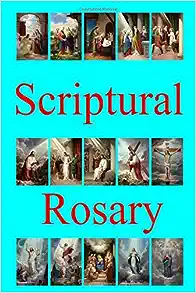
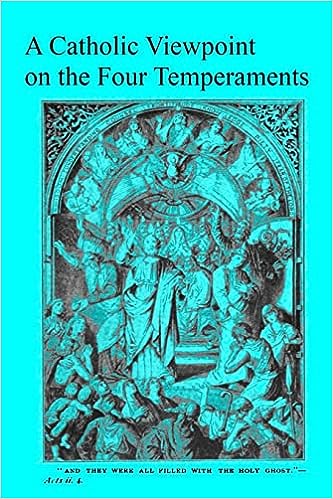







 Follow
Follow


